Wagner – Tristan und Isolde
Tristan – Michael Weinius
König Marke – Maxim Kuzmin-Karavaev
Isolde – Nina Stemme
Kurwenal – Andrei Bondarenko
Melot – Milijenko Turk
Brangäne – Violeta Urmana
Ein Hirt – Andrea Schifaudo
Ein Steuermann – Arturo Espinosa
Stimme eines jungen Seemanns – Andrea Schifaudo
Coro del Teatro Massimo, Orchestra del Teatro Massimo / Omer Meir Wellber.
Stage director – Daniele Menghini.
Teatro Massimo, Palermo, Italy. Wednesday, May 29th, 2024.
There are evenings that write the history of a theatre. Tonight, at the Teatro Massimo in Palermo was one of them. This new production of Tristan und Isolde marked the farewell of Nina Stemme to the title role, perhaps the role she has been most identified with over the years – and undoubtedly one that has helped her pay her bills. To mark the occasion, the Massimo assembled a luxury cast, with Violeta Urmana, one of the greatest Isoldes of our time as Brangäne, Stemme’s compatriot Michael Weinius as Tristan, Andrei Bondarenko as Kurwenal and Maxim Kuzmin-Karavaev as Marke. The house chorus and orchestra were placed under the direction of house Music Director, Omer Meir Wellber.
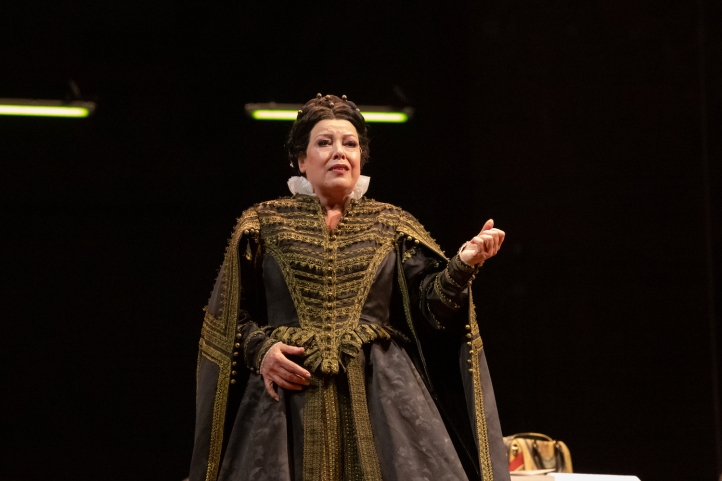
The staging was confided to Daniele Menghini. My only other experience of his work was a rather dreadful Carmen in Macerata last summer. Menghini began his staging with an interesting premise. He opened the evening with a bare stage, suggesting a rehearsal room. The cast began to sing their roles with scores from music stands, the ladies in pants suits, the gentlemen also in suits. As the evening evolved, Tristan and Isolde, then subsequently Brangäne and Kurwenal, changed into historical costumes as if incarnating a traditional production of the work. A naked man wearing wings, who gave us a lot to look at, perambulated around the stage. Menghini filled the stage with constant movement – a ballet corps rehearsing in the background, stage hands adjusting the stage furniture. It was all incredibly busy, so much so that one didn’t know where to look. Although no doubt many would have been entranced by the naked angel.
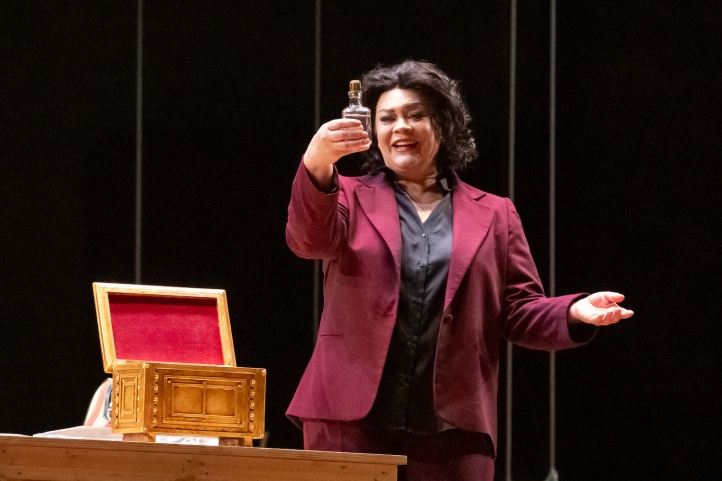
The best productions of Tristan und Isolde, such as Calixto Bieito’s in Vienna, are those that succeed in amplifying the impact of this revolutionary score, enhancing the music and making us feel. In Act 2, Menghini staged the love duet as a relatively traditional version. Yet even here, he was unable to avoid the temptation to add extraneous action, with figures presumably representing Romeo and Juliet and Hamlet, also perambulating around the stage. It was a shame to have Urmana float her warnings from on stage, having her so close meant they lacked the magic of distance that moment should have. As Marke entered, the rehearsal room reappeared, complete with stage crew disemboweling the Romeo figure and handing his organs to Tristan to give to Isolde. At least this gave something to look at during Marke’s lengthy monologue, I guess. The biggest annoyance came in the Liebestod. As she sang, a dresser helped Stemme’s Isolde remove her bulky stage costume. It meant that the impact of the big climax we had been waiting four and a half hours for was ruined because we feared Stemme would trip over the costume and fly into the pit. I must admit to regretting not resting my eyes at that point, but my sense of responsibility to report back to you, chers lecteurs, took priority.
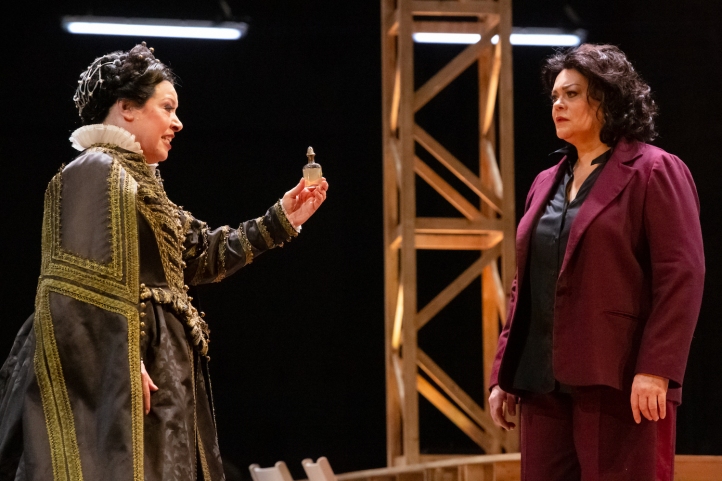
This was exceptionally frustrating because the musical performances gave us so much to enjoy. The house orchestra was on glorious form for Wellber. He led a reading that was delightfully swift, one where the hours flew by like seconds. His was an interpretation so full of insatiable erotic longing. The prelude was fired with overwhelming give and take, the long string lines so full of cantabile beauty, intertwining and joining in a way that forced you to let yourself go to the music. The Massimo acoustic helped with this, the sound was so clear and so full, allowing the silky strings and nicely forward winds to meld together beautifully. Never before have I felt that Act 3 prelude sound like waves coming on to shore at night, again Wellber leading that give and take, that erotic longing mixed with despair was so incredibly potent. There were a couple of ragged entries and brass splits, forgivable due to the length of the evening. Similarly, the closing pages of Act 1 were overwhelming. Wellber pushed through, with a sense of almost desperate urgency, the tenors, baritones and basses of the Massimo chorus making a tremendous noise from the highest balcony, bathing the auditorium in a golden glow, forcing us to give ourselves to this intoxicating score. It’s such a shame, then that the big climax of Act 3, lost so much impact due to the extraneous stage action. I can only image the impact Wellber and his fabulous orchestra would have had in Bieito’s staging, for instance.
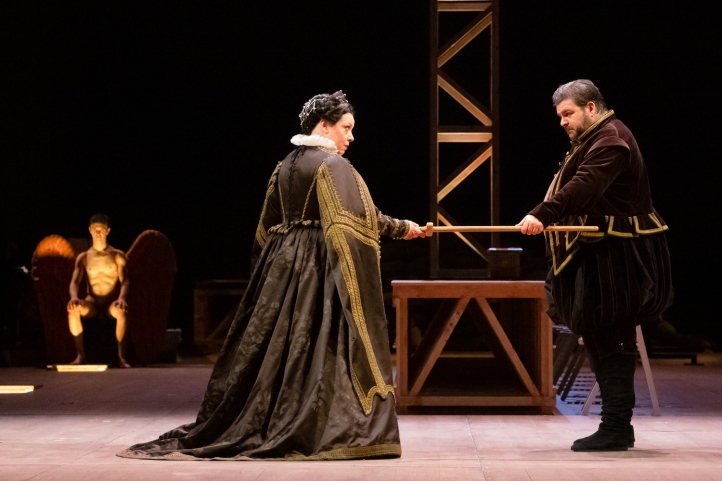
Weinius was fearless as Tristan. He sang the role in impeccable German, indeed his text was one of the clearest I’ve heard in this role. He savoured the words, pulling out meaning. His tenor isn’t the most glamourous perhaps, the tone bright yet sandy, but he has the power to ride the orchestra with ease in Act 3. He gave us singing of real sensitivity in the duet, scrupulously observing the dynamics, knowing exactly when to pull back without losing the integrity of the tone. He was tireless in Act 3, giving so generously of himself.

As Brangäne, Urmana sang with so much feeling and generosity. Her regret as she realized the implications of her actions with the potions was deeply moving. The voice is most definitely one that is ‘lived-in’, the vibrations are looser than of yore. Yet, her experience means that she brings out so much truth in the role, making Brangäne much more of a rounded character than we often hear, the sheer concern and esteem for Isolde so incredibly affecting to listen to. She floated her warnings beautifully, which made it more regrettable that she wasn’t placed more distantly. As with Weinius, so much of what she did was communicated through the text.
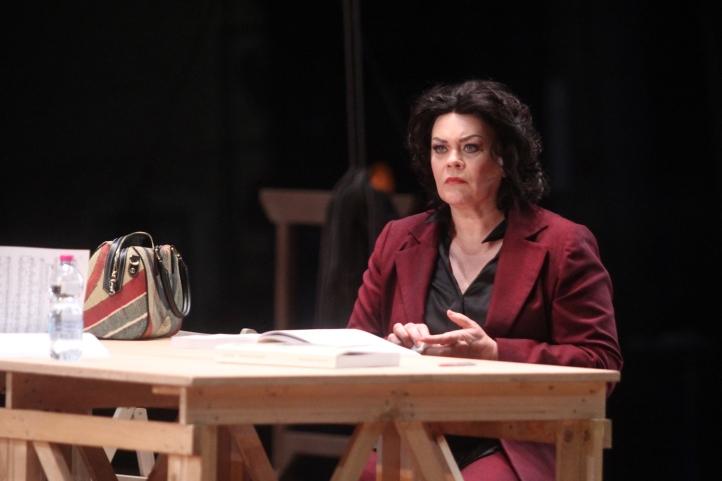
Bondarenko was a superb Kurwenal. The voice has fabulous amplitude, focused in tone in a huge column of sound. His German is also respectable. Kuzmin-Karavaev sang Marke in a richly resonant bass, although his German vowels were a bit fruity in sound. He made Marke’s long monologue a moment of introspection through his ability to exploit a wide palette of tone colours. In the smaller roles, Milijenko Turk, Andrea Schifaudo and Arturo Espinosa made much of little as Melot, the Hirt/Seeman, and Steuermann respectively.
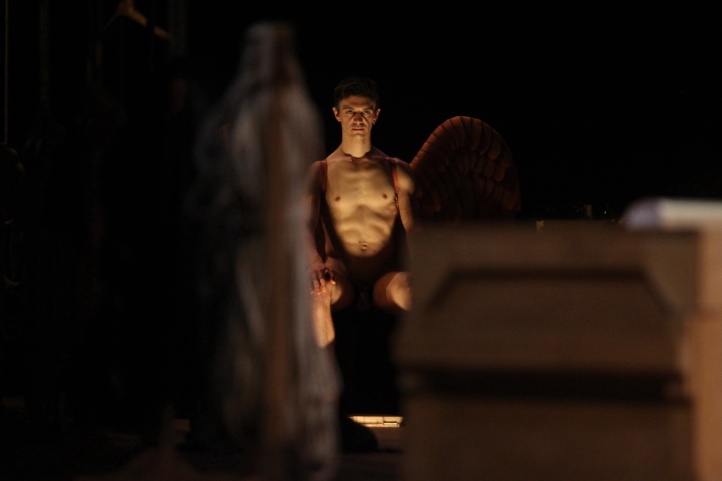
Then there was Stemme. She’s been singing this role for a quarter of a century and it must have been such an emotional occasion for her to say adieu to a part that has been so crucial to what has been a notable career. As with her recent Elektra in Baden-Baden in March, the fact that the voice is no longer in the first flush of youth, means that now, Stemme has to work harder to produce the sound, giving her singing a real intensity that hasn’t always been associated with her artistry. Menghini’s staging doesn’t give the cast much acoustic support, so Stemme was frequently placed on the front of the stage, which meant that she rang out into the auditorium with ever more apparent power. Hers was an Isolde that made its impact through the notes rather than their union with text. She can still float quite beautifully on high, while bringing out a dark, silky resonance at the bottom, one which will be of great use as she moves into her new repertoire. Tonight, she gave us an Isolde filled with generosity, one that caps a career that has seen her interpret the Irish princess on stages all over the world.
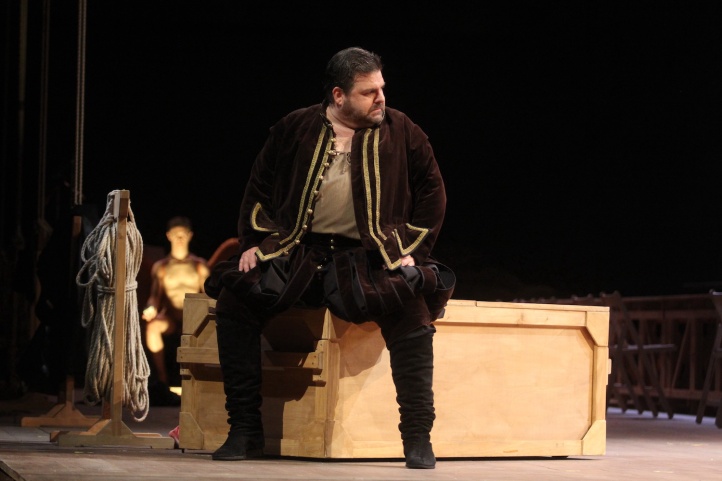
Tonight was one of those evenings of which one can be fortunate enough to say ‘I was there’. Stemme can look back at a career in which she has given so many people, so much happiness. She was surrounded by a luxury cast who brought real intensity, thanks also to a thrilling interpretation from the pit and an orchestra that made this score sing. Indeed, hearing Italian orchestras play Wagner is like a drug, they make this music soar in a way that few others do, and that was most definitely the case with the Massimo band today. Wellber led a reading of unbearable erotic charge, one that made the evening speed by as if in the blink of an eye. What a shame, then, that Menghini’s staging distracted so much. The audience responded with full and generous cheers at the close. And to Stemme we say, ‘tack och farväl’.
[…] was more German opera with a Tristan und Isolde in Palermo which was billed as Nina Stemme’s final account of the title role. One can only […]
[…] anything in particular to the drama, but instead became increasingly tedious. The second, was a Tristan und Isolde in Palermo, which began as a reading in a rehearsal room, morphed into a traditional production, […]
[…] satisfactory. These consisted of a Carmen in Macerata that made this vibrant opera tedious, a Tristan in Palermo that had a naked man perambulating the stage, and an Elisir in Turin that sucked the […]